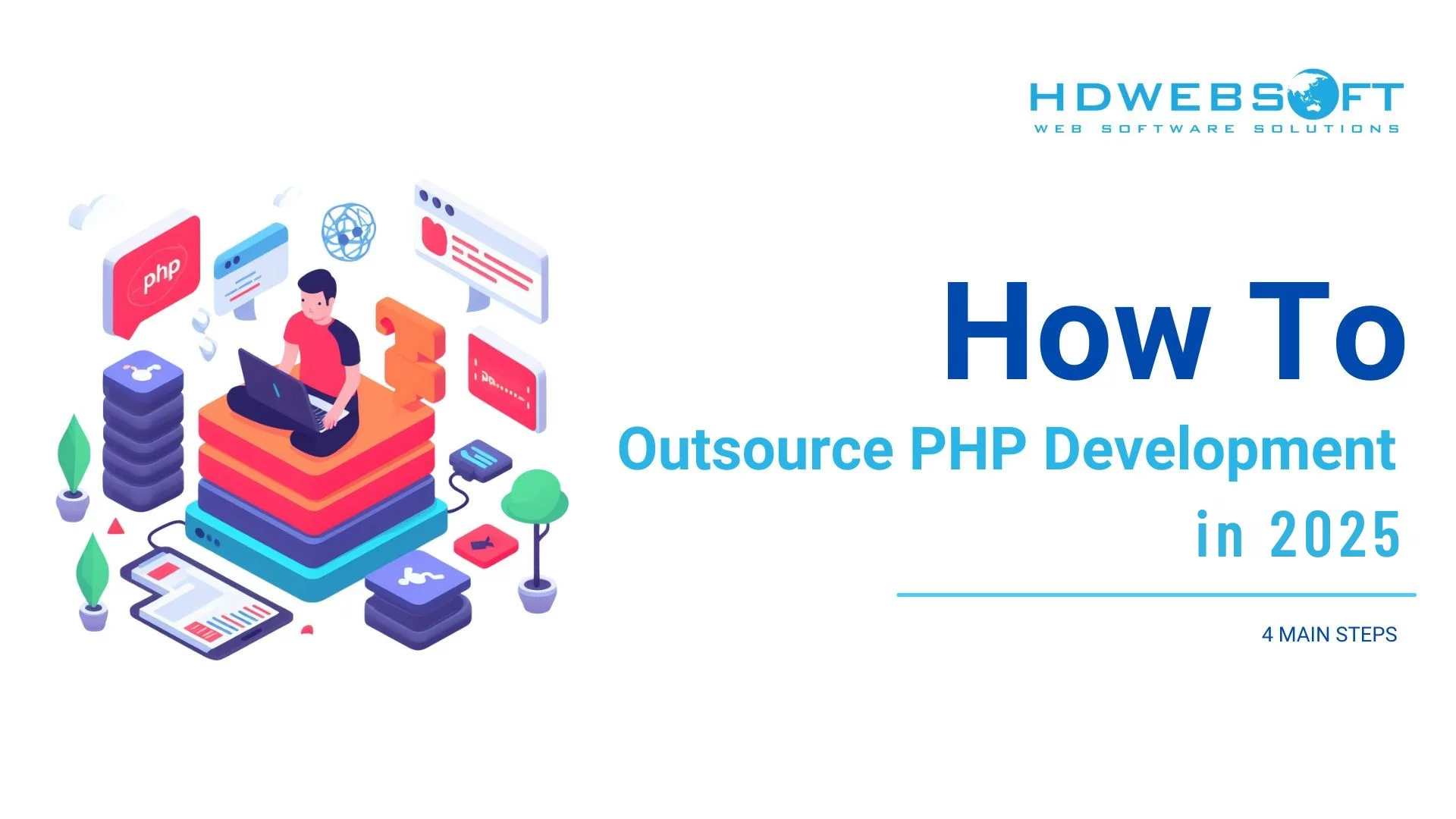
Why Fintech Leaders Are Betting Big on Outsourcing in 2025 and Beyond
Fintech outsourcing plays a crucial role in the evolving landscape of financial technology. Whether it involves traditional banking or innovative fintech solutions, outsourcing development services offer measurable advantages. In this article, key market trends, benefits, and best practices will be explored to help businesses navigate fintech outsourcing effectively.
- 1) Fintech Outsourcing Market Growth and Trends
- 2) Key Trends in Fintech Outsourcing
- 3) Benefits of Fintech Development Outsourcing
- 4) Challenges in Fintech Outsourcing
- 5) What Can Be Outsourced in Fintech?
- 6) Steps to Successfully Outsource Fintech Development
- 7) Choosing the Right Fintech Outsourcing Partner
- 8) Why Choose HDWEBSOFT?
- 9) Conclusion
Fintech Outsourcing Market Growth and Trends
The fintech sector continues to experience exponential growth. The global fintech market is forecasted to grow from USD 340.10 billion in 2024 to USD 1,152.06 billion by 2032, reflecting a compound annual growth rate (CAGR) of 16.5%. Factors contributing to this surge include widespread digitization, increasing integration of big data, and continuous innovation.
In the U.S., the fintech market achieved a valuation of USD 4.10 trillion in 2024. It is projected to grow at a CAGR of 11.2% from 2025 to 2034, fueled by the expansion of e-commerce and the growing adoption of mobile banking.
Key Trends in Fintech Outsourcing
Several transformative trends are shaping the future of fintech outsourcing:
- Embedded Finance & BaaS: Embedded financial services, including Banking-as-a-Service (BaaS), have gained momentum. Valued at USD 104.8 billion in 2024, the embedded finance market is expected to grow at a CAGR of 23.3% through 2034. These solutions allow non-financial entities to offer seamless financial services through APIs.
- Neobanks and InsurTech: Digital-first banks and technology-driven insurance platforms are disrupting traditional financial models, offering personalized, tech-enabled experiences.
- AI, Blockchain, and Biometric Technologies: Emerging technologies continue to drive innovation and enhance security in financial services.
Benefits of Fintech Development Outsourcing
Cost Optimization
Fintech development is inherently resource-intensive. Outsourcing mitigates these costs by providing access to skilled professionals without the long-term financial commitments of in-house teams. Businesses benefit from flexible pricing models, freeing capital for strategic initiatives such as R&D or marketing.
Access to Global Expertise
Outsourcing expands a company’s reach to a diverse, global talent pool. This approach brings in specialists in fields like AI, blockchain, and cybersecurity, enriching the project with cross-market insights and best practices.
Accelerated Time-to-Market
Speed is a competitive advantage in fintech. By bypassing the often slow hiring and onboarding processes of in-house teams, businesses can quickly launch products and respond to market demands more efficiently.
Focus on Core Business Functions
Delegating development tasks to outsourcing partners enables internal teams to concentrate on core business operations such as product strategy, compliance, and customer engagement. This focus is especially valuable when targeting emerging audiences like Gen Z, who demand mobile-first, fast, and personalized financial solutions.
Scalability and Flexibility
Outsourcing allows fintech companies to scale their development teams up or down based on project needs, without incurring long-term liabilities. This agility is essential for adapting to changing market conditions and business priorities.
Innovation through Collaboration
Global outsourcing brings together expertise from multiple domains and regions, fostering innovation. Collaborative partnerships can lead to breakthrough technology solutions that set companies apart in a competitive market.
Challenges in Fintech Outsourcing
Despite its benefits, fintech outsourcing presents specific challenges that businesses must address:
Data Security and Regulatory Compliance
Handling sensitive financial data requires strict adherence to security standards and regulations. It’s critical to partner with firms that comply with certifications such as SOC 2 and ISO 27001, and understand regulatory frameworks like GDPR or GLBA.
Quality Assurance and Vendor Oversight
Maintaining high-quality deliverables necessitates clear expectations, performance benchmarks, and regular audits. Agile methodologies and transparent communication channels can help mitigate risks.
Intellectual Property Protection
Protecting proprietary algorithms and business ideas is essential. Legal safeguards, including NDAs and well-structured IP agreements, help retain ownership and mitigate risks.
Cross-Cultural Communication and Time Zone Differences
Collaborating with teams across time zones requires proactive communication strategies, shared tools, and cultural awareness to prevent misunderstandings and maintain alignment.
See hơw HDWEBSOFT handles working with clients from different time zones.
Project Visibility and Control
Effective project management tools like Jira, Trello, or Asana ensure transparency, track milestones, and enable seamless collaboration.
What Can Be Outsourced in Fintech?
- Back-End Development: Ensures secure, efficient handling of transactions, data storage, and system integration.
- Front-End Development: Delivers intuitive, responsive user interfaces aligned with branding and usability best practices.
- Big Data & Analytics: Facilitates informed decision-making and risk mitigation through intelligent data processing and fraud detection systems.
- Business Process Outsourcing (BPO): Supports operations such as customer service, loan processing, and compliance, enhancing operational efficiency.
Steps to Successfully Outsource Fintech Development
- Define Requirements and Objectives: Clearly outline project scope, deliverables, and key performance indicators.
- Select the Right Outsourcing Model: Choose between onshore, nearshore, and offshore models based on budget, time zone, and project complexity.
- Identify the Ideal Region: Consider regions known for tech excellence, such as Eastern Europe, Southeast Asia, or Latin America.
- Vet Potential Vendors: Evaluate past projects, technical skills, and client feedback to assess vendor reliability.
- Formalize with Contracts: Use detailed outsourcing contracts to outline roles, timelines, confidentiality, and IP ownership.
- Adopt Agile Practices: Encourage iterative development, continuous feedback, and adaptability.
- Plan for Long-Term Maintenance: Ensure the vendor offers post-launch support, ongoing improvements, and software maintenance.
Choosing the Right Fintech Outsourcing Partner
Successful fintech outsourcing depends on selecting a vendor with the right balance of experience, technical capability, and alignment with your business culture.
- Evaluate Experience and Specialization: Review their portfolio and client testimonials to confirm relevant industry experience.
- Check Methodologies: Ensure the partner employs structured development methods and quality assurance protocols.
- Assess Security Standards: Confirm adherence to security best practices and legal compliance.
- Gauge Communication Fit: Cultural alignment and responsive communication channels are key to long-term collaboration.
- Negotiate Transparent Terms: Clear SLAs, cost structures, and IP agreements foster trust and prevent disputes.
Why Choose HDWEBSOFT?
With over a decade of experience in fintech development, HDWEBSOFT offers comprehensive outsourcing solutions tailored to your business objectives. Our team combines technical excellence with strong security standards to deliver reliable, future-ready fintech products.
From core banking systems to payment gateways, we provide customized services that support innovation and growth. Partner with us to accelerate your fintech journey and gain a competitive edge.
Conclusion
Fintech development outsourcing empowers businesses to enhance efficiency, reduce costs, and access specialized talent. While challenges exist, strategic planning, due diligence, and the right partnerships can unlock significant value. As the fintech industry continues to evolve, outsourcing remains a critical enabler of innovation and scalability.













